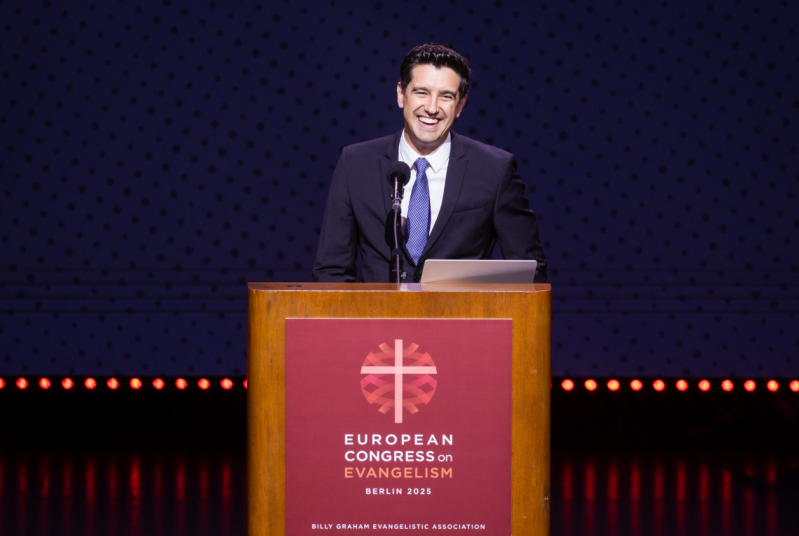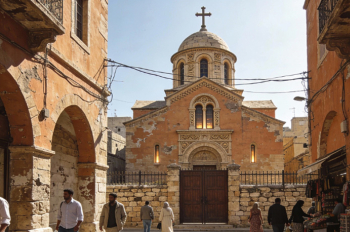
Hélder Favarin, originally from Brazil, is the CEO of Community Bible Study International, as well as an evangelist, missionary, author, and co-founding pastor of C29 Granada Church in Spain. He spoke on the topic “We Must Prepare Well for Preaching the Gospel” last Thursday (May 29) at the European Congress on Evangelism, hosted by the Billy Graham Evangelistic Association in Berlin, Germany.
Following his speech, Favarin gave an exclusive interview to Christian Daily International, in which he highlighted the spiritual challenges facing Spain and reflected on the key themes of his talk. He emphasized the importance of evangelicals preparing for evangelism—as the Apostle Paul once did—by “surrendering our wills, searching our hearts and [shaping] our minds” through attentive listening to God’s Word. He stressed that this preparation must also include a deep awareness of cultural distinctives among different people groups, which can significantly influence how the gospel is communicated.
***
“We need more churches in Spain. We have hundreds upon hundreds of towns and cities with no Protestant or evangelical churches,” surmises Favarin about the widespread challenges facing gospel witness in a country where only 1.61% are evangelicals, according to the Joshua Project. Statista noted 4,455 evangelical churches in Spain in January this year, 2025.
In Spain, Favarin says there is a strong background of Catholicism and also “what many describe as post secularization.”
“Both secularization and spirituality are growing, but there is great ignorance to the true gospel,” says Favarin about the spiritual landscape in Spain. “And there are a lot of preconceptions from people.”
These preconceptions stem from the persistent trope—especially common in Spain—that portrays evangelical churches as sects. Such perceptions cast a shadow over those considering a genuine commitment to Christ and involvement in an evangelical congregation.
“The Reformation never reached Spain, like all the parts of Southern Europe,” notes Favarin. “And I find that to be a challenge in multiplication of local churches and some of the social aspects.”
However, Favarin perceives a growing interest in spirituality across the country and believes that evangelical churches must respond in a way that differs from past approaches to evangelistic outreach. He emphasizes the need for a new posture in how Spanish evangelicals engage with their fellow citizens.
“We must make the most of this unique time,” urges Favarin. “Secularization and spirituality both grow. So I, again, would say we need to mobilize the whole church.
“We need to help everyone understand they are part of the team. It's not our pastors’ or evangelists’ work only. It's everyone's work on a daily basis wherever we are.”
“Connect with people and live their lives in banks, colleges and every sphere of society,” he adds, listing examples of how evangelicals can bolster relationships with non-Christians in everyday settings.
Favarin sees potential for building bridges with the Catholic Church in areas of shared concern and collaboration. However, he remains cautious about how closely Protestants and Catholics can work together. “I would be careful in how I answer this because it’s a broad topic,” he says, acknowledging the historical complexities surrounding the relationship.
“I think by all means, we can be working together in many ways. But I hesitate. I don’t want to be generalizing. There have been many bridges happening and hopefully, yes, I think as long as we are together proclaiming the gospel and living it out. But I understand there is a sensitivity there.
“Catholicism in places like Spain is lived out differently than in Northern Europe, for instance. But I welcome, by all means, the closeness and the possibility of us in Jesus' name working together.”
The Berlin Congress offered a unique opportunity for leaders focused on both Europe and evangelism to gather together and connect. “I think it’s a gift for us and for the continent,” says Favarin about the experience.
In his main session on Thursday, Favarin explored the example of the apostle Paul as a model for effective evangelism in Europe. He emphasized how Paul’s approach—rooted in a deep understanding of local cultures and guided by the application of God’s Word through the Holy Spirit—offers valuable insights for evangelicals seeking to proclaim the gospel boldly in today’s European context.
In Acts 16, Paul received a vision of the man in Macedonia “standing and begging” for help. The apostle responded in verse 10 by getting “ready at once to leave for Macedonia,” concluding that “God had called us to preach the gospel to them.” In Favarin’s view, this is an opening out of the evangelistic vision to encompass the wider continent.
“By God’s guidance, he’s called to Europe,” Favarin says. “So that's a significant point in history and in the biblical narrative.”
“Macedonia is, of course, in Europe, and Paul's vision led to the first evangelistic mission to this continent. But it was not Paul's idea to preach in Europe. It was God's idea. God disrupted all and his team's plans,” says Favarin in his earlier talk to the Berlin Congress delegates. “These men submitted to God's will.
“They made changes to their itinerary and traveled to Europe. That single act of surrender to God's guidance would change the course of European history forever. This was not Paul's mission. It was God's mission. It was not about Paul's plan or will.”
Before the apostle actually preached, however, Favarin wanted to “camp and observe” with the audience of Berlin Congress delegates what was actually happening in Paul’s “mind, his heart” in his preparation to preach.
Favarin thus sees a “God-given idea,” or rather a “policy strategy,” by the Lord in his calling Paul to Macedonia as a larger “coming to Europe.” He draws a parallel line with evangelicals musing over the spiritual realities of the continent and preparing themselves, some 2000 years after Paul, to evangelize Europeans.
“God disrupts his plan through the vision he calls into Europe,” says Favarin, as told in the interview. “And to us, we're calling us to fully surrender to Jesus as we are preparing, as we are looking around, as we pray for the people we want to reach.
“What would it mean for us to be fully surrendered to Christ and go wherever he's calling us and say whatever he's calling us to say?”
A second intention by Favarin was to invite congress delegates to “reflect on why we do what we do.”
This introspection is also connected to Paul’s dealings with Europe. This time in Acts 17:16, when the apostle arrives in Athens and feels provoked in his spirit by the idolatry he sees in Athens.
“That is the same word that the Septuagint, the Greek translation of the Old Testament, utilizes to talk about how God felt about the idolatry of his people,” Favarin points out.
“So in a way, Luke is connecting what Paul felt with what God felt and saying there was an internal reaction to that idolatry.
“I was making the point that we in Europe live in a very idolatrous society, with different gods now. We still build the biggest buildings to our gods — stadiums, online platforms, shopping centers. But asking ourselves, what do we feel before we are actually seeing? What do we feel?”
God may move in the hearts of evangelists and evangelicals and give a sense of “what he feels for the people that we want to reach,” adds Favarin.
“And then I was talking more about shaping our minds into senses, inviting us to really go deep into scriptures, to know the Word of God well,” says Favarin, summarizing his talk at the Berlin Congress. “So as evangelists and leaders preaching the gospel, allowing God to help us to think biblically about everything. So there was a challenge there in that regard. Paul was saying to Timothy, ‘You should handle well the word of truth.’”
At the same time, Favarin sees a prevalent need for an evangelist or evangelical to “know well the culture we want to reach.”
Favarin refers to what the late British pastor and theologian John Stott once termed “double listening,” which means listening to the Word of God while listening to the world of God at the same time.
Paul’s mind “was in scriptures” in Acts 17, according to Favarin, but he’s “able to relate the message to the culture he wanted to reach. He quotes Greek poets, for instance. And therefore, he's contextualizing the message, which is very different from what he does in Acts 13 or Acts 14 when he's speaking to other types of audience.”
European society today resembles more an Acts 17 than an Acts 13 society, says Favarin, adding: “Though many times our evangelistic approach is more of an Acts 13 than an Acts 17 approach.”
The challenge is for evangelicals and evangelists to realize that they too are called to “contextualize the proclamation” of the gospel, and this includes familiarization with European cultures and the identity traits of the people to be reached with God’s love.
“And evangelism, it's the gospel, but the way we do it must be different depending on the context,” Favarin spells out the challenge.
Since there are differing contexts, Favarin suggests some practical steps to consider. He believes these ideas would be especially helpful for evangelical church pastors. The groundwork for these ideas actually came from his own university doctorate about preaching.
“I feel there is a need for the local church to be not only strong in evangelism, but seeing itself as a missional community,” says Favarin. “So I really would like to invite our audience to consider our church as evangelistic communities, missional communities, and for us to speak to both Christians and non-Christians always.
“Be deep, but be relevant. Apply a Christ-centered hermeneutics. So we don't preach the Bible or Christ. We preach both always.”
Favarin also emphasizes contextualizing Sunday messages with apologetics in the calling of people to Christ.
“So that, again, we are communicating also always with non-Christians, giving context, defining biblical vocabulary. Otherwise, I know it happens all over the world, but thinking in Europe, our churches can feel very foreign to non-Christians. And many places here where evangelicals are particularly seen as a sect, and we must be building those bridges in our communication.”
Prayer underpins all such activities, and for Favarin, prayer needs to be the first priority and it needs to be intentional.
“All of these aspects, when brought together, will shape how we prepare ourselves,” concludes Favarin, mindful of the simple yet profound call to welcome others, understand them, and lead them toward Jesus.
Paul spent time walking around and spoke daily both in the Jewish synagogues and the marketplace. Favarin interprets this as the apostle “listening to the culture.” He saw the altar to “an unknown God,” and so his evangelistic message “doesn't begin with Jesus loves you because these people have no biblical framework.”
“He begins further back, the Creator. So, again, he's taking them by their hands and carrying them all along,” said Favarin, adding that in our current context in Europe, “I think we need to do more of that.”






